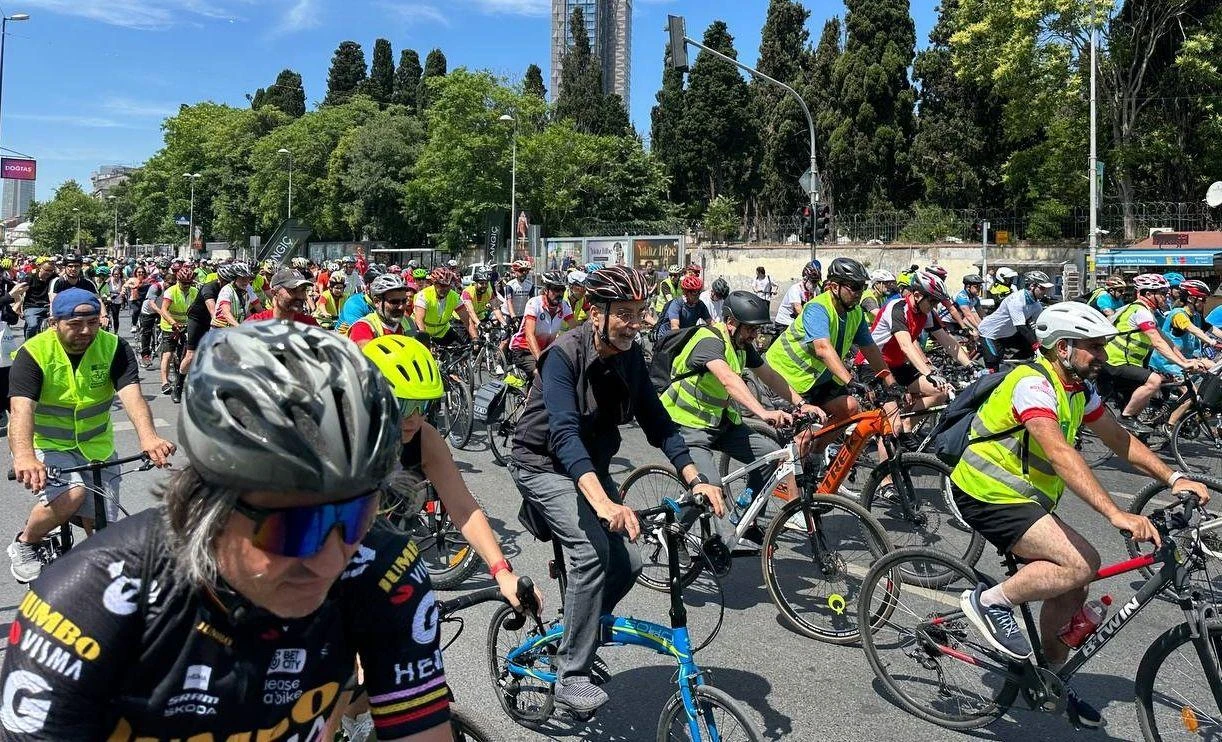Making cycling safe in Türkiye on World Cycling Day

Türkiye Bicycle Federation President Emin Muftuoglu delivered an important message on June 3, World Cycling Day.
He emphasized the benefits of cycling for a healthier society and cleaner cities. Muftuoglu mentioned the federation’s collaboration with public institutions, local governments, and the private sector to promote cycling through various events while speaking to Anadolu Agency (AA).
“It is our common desire to ensure the increased use of bicycles in our cities as a means of transportation, sport, and recreation towards a healthier society and cleaner cities,” Muftuoglu stated. He expressed satisfaction with the growing popularity of cycling across all segments of society, even though the number of cyclists has not yet reached the desired level.
Muftuoglu noted that around 10,000 athletes renew their cycling licenses annually. He believes that as more people use bicycles for transportation, health, sports, and leisure, the pool of athletes will naturally expand.
The growing popularity of bicycles in Türkiye
Cycling has become more popular in Türkiye in recent years, with significant efforts to integrate it into everyday life. Cities like Konya, Eskisehir, and Izmir have been at the forefront of developing cycling infrastructure. Konya, in particular, stands out with its extensive network of bike paths, the longest in Türkiye, spanning over 550 kilometers. The city aims to reach 1,000 kilometers of bike paths by 2023, promoting cycling as a viable and healthy mode of transportation.
Despite these advancements, the use of bicycles in Türkiye is still growing. According to Euromonitor International, Türkiye ranks 29th globally in bicycle possession. The country has an estimated 30 million usable bicycles, with approximately 50 million users. However, adult usage remains relatively low, with cycling predominantly viewed as an activity for children and young adults.
Safety, infrastructure challenges for cyclists in Türkiye
Cyclists in Türkiye face significant challenges, with safety being a primary concern. The country needs more dedicated bike lanes and better integration with public transportation systems. Several projects are underway to enhance cycling infrastructure. The Ministry of Environment, Urbanization, and Climate Change is working to expand bike-friendly transportation networks.
Muftuoglu stressed the importance of safe cycling routes, noting, “Secure bike lane infrastructure is crucial for increasing the rate of bicycle use.” Local governments and various institutions are launching initiatives to promote cycling and ensure the safety of cyclists on the roads.
Cycling events and routes in Türkiye
To celebrate World Cycling Day, the Turkiye Bicycle Federation has organized events across all 81 provinces. These events, under the slogan “Choose the Bicycle for a Livable World,” aim to promote cycling for sport, transportation, health, environment, and climate. In Ankara, a significant event is planned in collaboration with the Turkmenistan Embassy, recognizing their proposal to the United Nations to mark June 3 as World Cycling Day.
Türkiye offers numerous scenic and challenging cycling routes for those looking to explore on two wheels. The Artvin-Trabzon route offers a breathtaking 230 km journey through tea plantations and natural beauty. In Sapanca, cyclists can enjoy routes that combine sport and transportation, with the area hosting the 2020 Marathon Mountain Bike World Championships. Izmir provides diverse options with forest trails and challenging climbs, such as the Meryem Ana Climb in Selcuk. Other notable routes include Fethiye-Babadag, Kars, Kapadokya, and Trakya, each offering unique landscapes and cycling experiences.
Encouraging a cycling culture
Muftuoglu expressed optimism about the future of cycling in Türkiye. He highlighted the increasing number of people engaged in various roles within the cycling community. From cyclists and trainers to bike mechanics and industry professionals, cycling is gaining a broader base of support. The integration of cycling into public media and the organization of events like the Presidential Tour of Türkiye have also contributed to the growing cycling culture.
The Türkiye Bicycle Federation is working closely with local governments, relevant ministries, and civil society organizations to overcome barriers to cycling and promote it as a mainstream activity. Muftuoglu stated, “We are in a mobilization effort with ministries, our federation, local governments, the bicycle industry, NGOs, and the press to overcome obstacles and promote cycling.”



